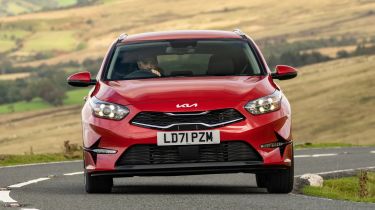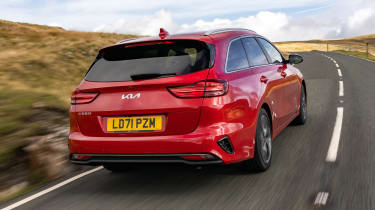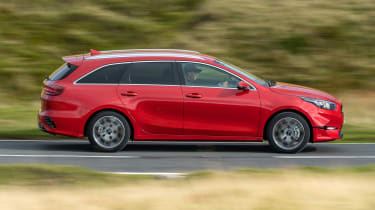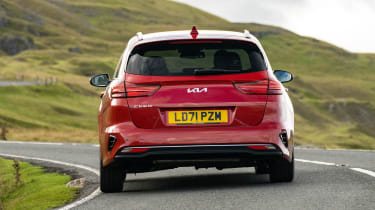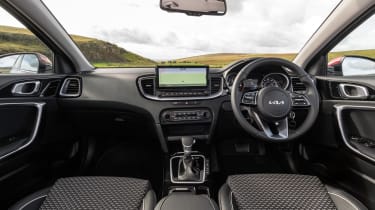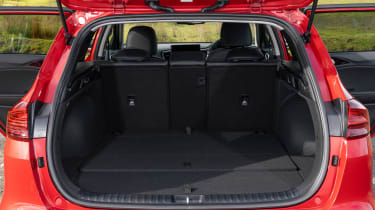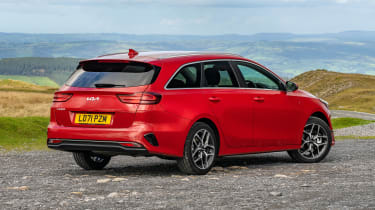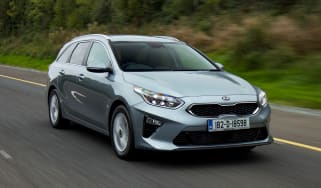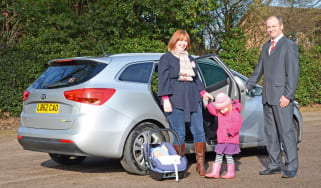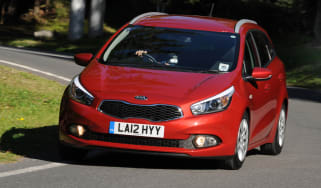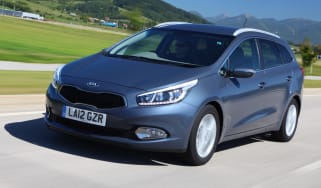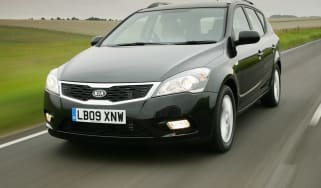Kia Ceed Sportswagon review
Does the Kia Ceed SW Estate – or Sportswagon – live up to the promise of the five-door hatch?

The Kia Ceed Sportswagon is a roomy family estate that’s worth considering if you’re in the market for a competent compact carry-all. It has just about as much room in the back as a Ford Focus Estate or Volkswagen Golf Estate, and drives well enough to keep most owners happy. With good equipment levels, a comfortable ride and an easy-to-use interior, there’s not much to criticise.
One downside - in typical estate-car fashion - is a little more interior noise than the regular hatchback when the boot is empty, and the Ceed isn’t especially thrilling to drive, either.
About the Kia Ceed Sportswagon
The Kia Ceed hatchback arrived in its third generation in 2018, and the Sportswagon (‘estate’ to the rest of us) followed soon afterwards. It’s an important car for Kia in the UK, where typically 40 per cent of Ceeds have been configured as estate models. That’s partly why the Proceed (formally the three-door Ceed) has morphed into a kind of shooting-brake estate for this latest generation, providing another practical option for buyers - just with a little more style.
The Ceed Sportswagon shares its front-end styling with the hatch – inspired by the sporty-looking Kia Stinger – but the back end is considerably altered thanks to a rear overhang increased by 115mm and an elongated roofline.
Used - available now

2024 Cupra
Formentor
44,913 milesAutomaticPetrol1.5L
Cash £20,497
2023 Vauxhall
Corsa
7,795 milesManualPetrol1.2L
Cash £14,697
2022 Ford
Fiesta
28,320 milesAutomaticPetrol1.0L
Cash £14,397
2018 Nissan
Micra
20,600 milesManualPetrol0.9L
Cash £8,876Standard-fit roof rails and plastic fake vents behind the rear wheels help disguise the extra length, and the rear end looks reasonably sharp with LED tail lights and a body-coloured spoiler on top of the tailgate.
There’s more good news inside, thanks to a handy floating infotainment screen that’s easier to use than the screens in some of its rivals. Regarding quality, it’s certainly the equal of Focus Estate, and is knocking on the door of the class leaders.
There are only two varieties of the Ceed Sportswagon, with the entry model being the Sportswagon ‘2’. It has 16-inch alloy wheels, air-conditioning, an eight-inch touchscreen with smartphone compatibility and voice control, a six-speaker sound system, a reversing camera, cruise control and autonomous emergency braking.
The Sportwagon ‘3’ has 17-inch alloys, dual-zone air-con and a 10.25-inch touchscreen with navigation. The spec is lifted further with privacy glass, rain-sensing wipers, LED headlights and rear parking sensors.
There’s only one engine option, a turbocharged, 158bhp 1.5-litre petrol. It offers a best-of-both-worlds mix of decent performance with some respectable fuel economy for a petrol estate. The downside is that there’s no fuel-sipping hybrid like the Toyota Corolla Touring Sports, a company-car-friendly plug-in hybrid like the Skoda Octavia iV, or an all-electric model like the MG5 and upcoming Vauxhall Astra Electric.
Engines, performance and drive
The driving attributes of the Kia Ceed Sportswagon are very similar to those of the hatchback, which is what you’d expect because the two are identical under the skin. There’s no reduction in stability or grip, and nothing in the handling characteristics suggests you’re paying a penalty for the extra luggage space tacked on the back.
It’s worth noting that the 16-inch alloys give the Ceed Sportswagon a more comfortable and pliant ride than the sporty-looking 17-inch alternatives found on the ‘3’ spec version. The latter introduces an element of harshness to the ride quality that can be annoying. It’s fair to say the Ceed, in all guises, is a little less comfort-focused than a Volkswagen Golf Estate.
Most buyers will find the Ceed Sportswagon more than satisfactory because it feels stable and composed on twisty roads. However, there’s no doubt that the Ford Focus Estate is more fun to drive.
Engines, 0-60 acceleration and top speed
The Ceed Sportswagon has a single engine: a turbocharged, 158bhp 1.5-litre petrol. Its power figure compares well with VW Group equivalents, narrowly beating the 0-62mph times of the 148bhp 1.5-litre Golf Estate or Skoda Octavia Estate, at 8.6 seconds.
If you want a faster estate, you’ll need to look towards the electric MG5, or a 2.0-litre equipped Toyota Corolla Touring Sports.
MPG, CO2 and Running Costs
There’s only one petrol engine choice in the Kia Ceed Sportswagon, so it is at a disadvantage next to the hybrid Toyota Corolla Touring Sports or diesel-powered Skoda Octavia and Volkswagen Golf estates.
The official WLTP figure of 50.4mpg from the Ceed Sportswagon compares favourably with its similarly powerful 1.5-litre competition in the Octavia and Golf estates, but is narrowly pipped by the 1.0-litre Ford Focus Estate. None can match the 62.8mpg of the Corolla Touring Sports, though.
That rival also has lower emissions, with a figure of just 101g/km compared with the 126g/km result for the Ceed Sportswagon. That means the Toyota sits in a lower benefit-in-kind (BIK) taxation band than the Kia, which will be important for company car drivers. Neither can match the zero-emission MG5, though, upon which you pay a fraction of the company car tax.
Insurance groups
There won’t be many shocks on the insurance front for Ceed Sportswagon owners, as the insurance groups are competitive and pretty low. The cheapest model to insure is - predictably - the least expensive ‘2’ version in group 14. The range-topping ‘3’ is in group 15, the same as the least powerful 1.0-litre Focus Estate. You’ll spend a little more insuring a 1.8-litre Corolla Touring Sports in group 17, and a little more again to get cover on a 1.5-litre Golf Estate or equivalent 1.5-litre Octavia Estate in group 19.
Depreciation
Resale values of the Ceed Sportswagon range are expected to be 47% for the ‘3’ after three years/36,000 miles, or 52% for the entry-level ‘2’. That means the Ceed Sportswagon will outperform the Focus Estate, and do similarly well compared with the Golf and electric MG5. It can’t match the 55% figure of the Corolla Touring Sports, though.
However, due to the Ceed Sportswagon costing considerably less than its rivals, the amount of money you’ll lose will likely be small.
To get an accurate valuation on a specific model check out our free car valuation tool...
Interior, design and technology
There’s a bit of sparkle in the cabin due to some chrome-effect detailing, a swooping dashboard shape that looks contemporary and attractive, plus ‘3’ trim comes with a large central touchscreen with live data services (such as weather, traffic reports, speed camera locations, along with sports results) for seven years. It’s all easy and intuitive to use, and the overall feeling is one of quality, but there are one or two applications of cheap, hard-feeling plastic that you wouldn’t find in a leading European rival.
At least the Ceed Sportswagon wins some points back in terms of ease of use, because unlike its Ford Focus, Skoda Octavia, and Volkswagen Golf estate rivals, many of the controls you frequently use (such as the air-con) still have buttons and dials, and haven’t migrated into a large touchscreen that’s awkward to use on the move.
The exterior of the Ceed Sportswagon is very close in design to the regular hatch, apart from the extended roofline and rear overhang mentioned previously. All models look respectable with body-colour bumpers and alloy wheels, body-colour door handles and mirrors, chrome window surrounds, and roof rails. Projector-style headlamps give a contemporary feel up front, and the lavishly equipped ‘3’ adds brighter LED headlamps.
Sat-nav, stereo and infotainment
The entry-level ‘2’ car gets the standard eight-inch touchscreen, while upgrading to ‘3’ trim earns you the bigger 10.25-inch touchscreen with sat-nav, plus the handy ‘connected’ services for the same seven-year period as the Kia warranty. Both screens have intuitive menus that are reasonably easy to use on the move.
All models get a decent six-speaker audio set-up with DAB radio, USB and aux connectors, as well as Apple CarPlay and Android Auto with voice control. It is a shame you can’t get an upgraded sound system with the Ceed Sportswagon, because we think that would help drown out the additional road noise it suffers with compared with the regular hatchback.
Practicality, comfort and boot space
The roomy boot is a key selling point for the Kia Ceed Sportswagon, which is one of the more practical options in the compact estate sector. The latest Ceed Sportswagon is broader and longer than its predecessor, meaning occupants have more space than in the old model.
The designers have allowed plenty of storage for oddments with decent door bins and a roomy glovebox, while you also get two cupholders in the practical cabin.
The driving position offers plenty of adjustment, with lots of movement in the seat and steering wheel, suggesting that people of all shapes and sizes should be comfortable.
Dimensions and size
The estate version of the Kia Ceed is 1,465mm tall, 1,800mm wide, and 4,605mm long. The latter is a noticeable extension over the hatchback at around 4,300mm long, although the Volkswagen Golf Estate is longer still at 4633mm.
That rival isn’t as wide as the Ceed Sportswagon, though, which might be important to those looking to carry three people across the back seat.
Leg room, head room & passenger space
The greater volume of the latest Ceed Sportswagon, which means all occupants benefit from more space at the front and rear. There’s plenty of headroom up front, and decent shoulder room for passengers in the rear. Anyone with tall teens, or who regularly carries adults in the back, may want to consider the Skoda Octavia Estate because that has more rear legroom than the Ceed Sportswagon.
Boot space
The Kia Ceed Sportswagon’s boot is not only large but it’s also well thought out. It has a storage area under the floor for valuables or rarely-needed items, and hooks are fitted as standard to help keep things tied down.
The rear seat folds 60:40, and there are levers in the boot to drop the seat backs. There’s a low loading lip to help when loading longer items in the back, and with 600 litres of luggage volume, the Ceed Sportswagon is a viable competitor for the Golf and Skoda Octavia Estates.
Towing
The Sportwagon’s braked towing capacity is 1,000kg, which is somewhat shy of the 1,500kg you can expect of a diesel-powered Golf or Octavia Estate.
Reliability and Safety
The Kia brand recorded a six-place finish in the 2023 Driver Power owner satisfaction survey, with owners confident that their choice of car won’t leave them stranded. That put the Korean manufacturer well ahead of rivals Skoda, Volkswagen, and Ford.
Euro NCAP has tested the Ceed hatchback, but the same result also applies to the Sportswagon. It managed the expected five-star rating back in 2019, provided it came with the more sophisticated autonomous emergency braking system fitted to higher trim levels - without it, the Ceed was only a four-star car. This fancier AEB system is standard now across all trim levels.
There’s plenty of safety kit; even the entry model Sportswagon gets Lane Keeping Assist, Forward Collision Warning, stability control, ABS, Hill-Start Assist and Tyre Pressure Monitoring, but you can’t have a Blind Spot Warning system to warn you of approaching vehicles on either side of you, or adaptive cruise control, both of which are standard on the range-topping GT-Line S in the Ceed hatchback range.
The roster of passive safety kit includes twin front airbags, along with twin side- and curtain airbags. The latest top-tether ISOFIX child seat mounts can be found in the rear, and there’s a front passenger airbag cut-off switch so you can more safely fit a child seat in the front.
Warranty
You can’t fault the Kia Warranty offer, which is leagues ahead of most rivals with a full seven years of cover up to 100,000 miles. The first three years include unlimited mileage. You also get one year’s free roadside assistance.
The only rival that can better this is the Toyota Corolla Touring Sports, which covers the car for up to 10 years/100,000 miles provided you annually service your car with a Toyota dealer.
Servicing
Kia offers two servicing packages, called Care 3 and Care 3 Plus. These packages are for three- and five years, respectively, and cost around £300 or £600 for all-inclusive maintenance – wear and tear items excepted.
Servicing is required every 12 months or 10,000 miles.

